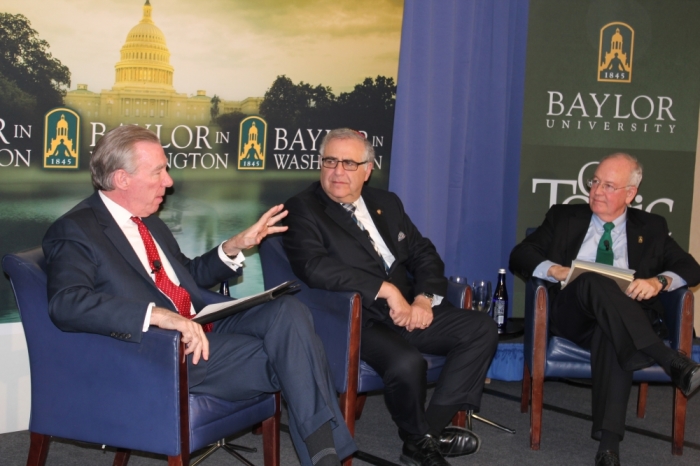Purpose of College is Not to Get a Job, is to Instill Ethical Responsibilities, Say Presidents of Catholic University, Yeshiva University

The presidents from three leading American faith-based universities convened Wednesday to discuss the role of faith-based colleges in an increasingly secular society and agreed that faith-based schools, more so than secular schools, stress the importance of living lives filled with morals, ethics and responsibility to others.
John Garvey of Catholic University of America and Richard Joel of the the New York-based and Jewish Yeshiva University participated in a Wednesday night discussion on the state of higher education and the calling of faith-based universities, which was moderated and hosted by Baylor University President and Chancellor Ken Starr at the National Press Club.
Although all the presidents agreed that that it is imperative for colleges to provide students with the skills and knowledge needed to be successful in a career, what is equally as important and often overlooked by state and secular schools in today's secular environment, is making sure that students are prepared to make tough moral and ethical choices when they are faced with many of life's tough dilemmas.
"The Jewish tradition believes that there is no bad ideas, that you should explore everything but that you bring a moral, ethical and purposeful judgement to how we relate to those ideas," Joel said. "Ideas are never the enemy, it is how we abuse or pervert those ideas …. We have enough confidence in our ethos and our values to believe that our ideals can confront ideas and hopefully shape them."
Joel further added that the responsibility of faith-based schools goes deeper than just instilling morals and righteousness, but also to keep alive the idea that humans beings are more than just the top of the food chain. Joel explained that Yeshiva University strives on the motto that "education is meant to Ennoble and Enable."
"I think it comes to the initial conceptualization of the worth of a human and whether we are simply the highest animals in the food chain or whether there is something noble about us or sacred. Do we teach them that they are supposed to do more than graze, make money and go shopping?" Joel asked. "I understand that in America, unless you choose to go to a faith-based or mission-driven university, you want to go somewhere where you don't have to buy into an orthodoxy. It seems to me that we have gone a little too far to divorce that sense of struggling with the essence of the human being and saying that it is too dangerous in our pluralistic society to deal with it, so just deal with arts and science."
Garvey agreed with Joel's notion that education's role is to "ennoble and enable" and put it into his own context of providing "wisdom and virtue."
"I am fond of saying that the point of education is to help our students advance in wisdom and virtue. These are both things that we do and they are connected to one another in a surprising way," Garvey said. "I like Aristotle's phrase that 'when we are educating people, virtue makes us aim at the right mark and wisdom tells us how to choose the proper means.'
"What he means is when we are learning about subjects like the history of capitalism, or the economy, or the environment, or mercantilism, we cannot make proper judgements about these without having an ethical foundation to make our judgements," Garvey added. "Our judgements will be better or worse depending on what kind of people we are."
Joel said another major part of the Yeshiva education experience is making sure students gain an understanding of their responsibility to help the less fortunate. He explained that Yeshiva students have helped the distraught people in Haiti, taught middle school science to inner city Dominicans, and taught English to people in the South of Israel.
"The student experience at Yeshiva University is one of… wholeness or integrity. The goal at Yeshiva University is to provoke the student to have his or her pieces come together," Joel said. "'My intellectual piece, my dreaming piece, my service to society piece, my aspiration for career, my communal piece, how do I get whole so I get to have that great gift, which is responsibility?'"
Garvey explained that the student life at Catholic University is in many ways similar to that of Yeshiva, adding that Catholic University students also go on mission trips.
Starr said that at Baylor University there is a Christian calling to ensure that the students understand the concept of maintaining a "caring community" and living to serve the needs of others.
"The creation of a very purposeful community, what we call the caring community, is vibrant and evident. It makes for a joyful place that sets us apart in terms of degrees of happiness," Starr told reporters after the event. "We talk about 'live life greatly.' That means in our Christian tradition, 'don't live for yourself.'"




























